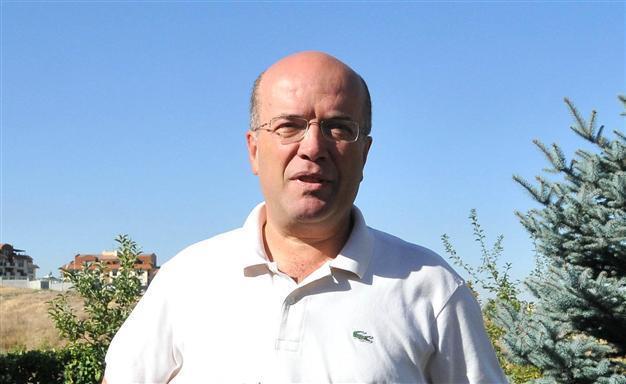Civil servants from economy, foreign and justice ministries flock in be on nominee lists
Sevil Erkuş / Neşe Karanfil / OkanKonuralp

Deputy Foreign Minister Naci Koru is among the names considered as potential nominees. Hürriyet Photo
Senior civil servants who have been eager to play on the political stage, have flocked into offices related to their institutions in order to submit their resignations ahead of the Feb. 10 deadline for civil servants to resign in order to be nominated as candidates for the June 7 parliamentary elections.Although a number of veteran diplomats from the Foreign Ministry have already taken the required steps, they were still expected to exhaust the deadline, which is 5.00 p.m., for the final official procedure.
Ambassador Hulusi Kılıç is expected to submit his resignation on Feb. 10. Ambassador Kılıç had been chief of the protocol department of the Council of Ministers before he was appointed Turkey’s ambassador to Baku.
He is currently serving as General Director of Bilateral Political Affairs at the Foreign Ministry. Kılıç is planning to run for the ruling Justice and Development Party (AKP), Hürriyet Daily News has learned.
Another high-profile diplomat from the Foreign Ministry, Deputy Foreign Minister Naci Koru, is among the names considered as a potential nominee from the ruling party.
Ambassador Koru has been serving as deputy foreign minister since 2012. Earlier, he had served as deputy undersecretary responsible for the administration, personnel, and archives of the ministry and was also ambassador to the Turkish Embassy in Riyadh.
The undersecretary of the Finance Ministry, Naci Ağbal, and Adnan Boynukara, chief advisor at the Justice Ministry, have already given their resignation, while the chief of the country’s energy watchdog and director-general of the Turkish railways are among those senior civil servants who are expected to resign before the deadline.
Undersecretary Metin Kilci of the Energy and National Resources Ministry, President Mustafa Yılmaz of the Energy Market Regulatory Authority (EPDK) and Director-General Süleyman Karaman of the Turkish State Railways (TCDD) are among those who are likely to exhaust the deadline.
Ambassador Hüseyin Avni Bıçaklı had already resigned from his post on Feb. 6 in order to run for the Nationalist Movement Party (MHP). He had earlier run in the 2011 general elections for the MHP before returning to the ministry.
The Turkish Ambassador to Chad, Ahmet Kavas, a former academic, and the Turkish Ambassador to Indonesia, Zekeriya Akçam, a former advisor to President Recep Tayyip Erdoğan, are among the names being mentioned in Foreign Ministry corridors.
Peace process on nominee lists
Meanwhile, the government-led peace process which kicked off in late 2012 through meetings between state officials and the jailed leader of the outlawed Kurdistan Workers’ Party (PKK), Abdullah Öcalan, put its mark on the nomination lists of the ruling party and the main opposition party, as well as of the Peoples’ Democratic Party (HDP), a key stakeholder in the process.
Intelligence chief Hakan Fidan, the undersecretary of the National Intelligence Organization (MİT), and Boynukara, who resigned from their posts in order to run for parliament for the ruling party, are both deeply involved in the process aimed at ending the three-decade long conflict between Turkey’s security forces and the PKK.
Hüseyin Yayman, a professor at Ankara’s Gazi University, known for his book titled “Türkiye’nin Kürt Sorununun Hafızası” (The Public Memory of the Kurdish Question in Turkey), also resigned in order to become a nominee on the ruling party ticket. Prime Minister Ahmet Davutoğlu’s senior adviser Taha Özhan did likewise. A former general coordinator of the Foundation for Political, Economic and Social Research (SETA), a think-tank known to be close to the AKP, Özhan is known for his studies on institutional dimensions of the peace process.
As for the main opposition Republican People’s Party (CHP), deputy chairs Murat Özçelik and Enis Berberoğlu are likely to run for parliament.
Özçelik is known for his in-depth knowledge of and experience in Iraq affairs and the Kurdish issue.
After serving as Turkey’s special representative for Iraq from 2007 to 2009, he served as Turkey’s ambassador in Baghdad until October 2011, when he was appointed as the head of Undersecretariat of Public Order and Security.
In May 2012, he resigned from his post at the key institution, which has played a central role in the government-led resolution and peace process.
Berberoğlu was the former editor-in-chief of daily Hürriyet who took the initiative to feature an interview with veteran Kurdish politician Leyla Zana on the front page of the newspaper in June 2012, when she said, “The person who has the most power can stop this issue. I believe it is the head of the government, Recep Tayyip Erdoğan, who will solve this issue. I haven’t given up my hopes about this. Now we should all make him feel that we support him.”
















